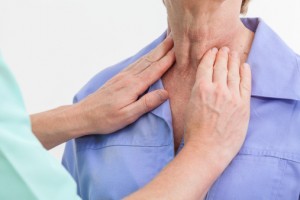For most, high blood pressure, or hypertension is can be attributed to family history or lifestyle. For some, however, high blood pressure is the result of either an overactive or underactive thyroid.
 An overactive thyroid, known as hyperthyroidism, is a condition where the thyroid gland produces too much of the thyroid hormone. When too much of this hormone is produced, the heart is forced to work harder than usual, which increases heart rate and raises blood pressure. Hyperthyroidism is the more common thyroid disorder that can cause hypertension.
An overactive thyroid, known as hyperthyroidism, is a condition where the thyroid gland produces too much of the thyroid hormone. When too much of this hormone is produced, the heart is forced to work harder than usual, which increases heart rate and raises blood pressure. Hyperthyroidism is the more common thyroid disorder that can cause hypertension.
Conversely, hypothyroidism occurs when the thyroid gland is underactive and does not produce enough hormones. Hypothyroidism can weaken the heart muscle and heart rate, reducing the heart’s pumping capacity and increase the stiffening of blood-vessel walls. The combination of these changes can lead to hypertension.
If a thyroid disorder is the reason for high blood pressure, adjustments in diet and lifestyle won’t resolve the problem and medications may not be effective. If a patient’s blood pressure does not respond to conventional treatment, a doctor can perform tests to see if the thyroid is the cause.
In cases where hypertension due to a thyroid disorder is diagnosed, medications or supplemental hormones can be prescribed to control the thyroid gland and better control blood pressure.
If you suspect you have a thyroid condition that is affecting your blood pressure, you should speak with a doctor. Jamaica Hospital’s Department of Family Medicine can help. To make an appointment, please call 718-657-7093.
All content of this newsletter is intended for general information purposes only and is not intended or implied to be a substitute for professional medical advice, diagnosis or treatment. Please consult a medical professional before adopting any of the suggestions on this page. You must never disregard professional medical advice or delay seeking medical treatment based upon any content of this newsletter. PROMPTLY CONSULT YOUR PHYSICIAN OR CALL 911 IF YOU BELIEVE YOU HAVE A MEDICAL EMERGENCY.
